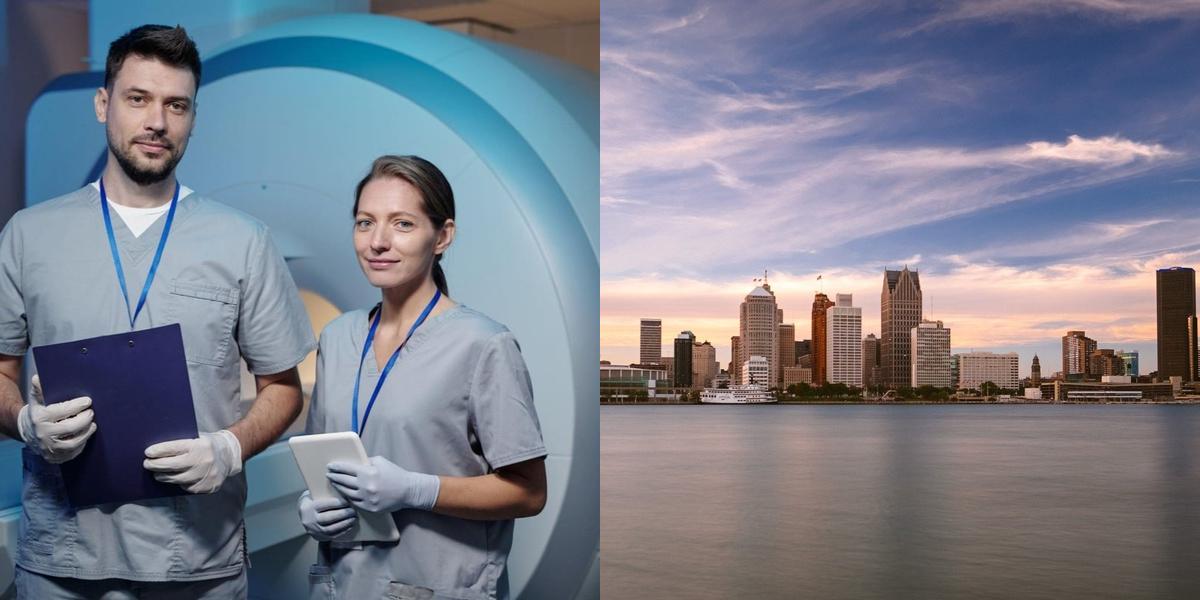How to Become a Radiology Technician in Michigan (2025)

If you want a career in Michigan's healthcare sector that blends technology with direct patient care, becoming a licensed Radiologic Technologist is a direct, two-year path to a stable, well-paying job. With nearly 9,000 technologists in the state earning a median salary of $68,500 annually, according to the U.S. Bureau of Labor Statistics, the field offers strong security and income. This guide provides the definitive 5-step process to navigate Michigan's mandatory training, certification, and licensing requirements.
5. Pursue Advanced Education
Your initial radiography license is a launching pad. To increase your salary and career options, you can pursue advanced certifications in specialized areas like MRI, CT, Mammography, or Interventional Radiology. Many of these require just a few months of additional training
How Long Does It Take to Become a Radiology Technician?
It typically takes two years to complete the required Associate of Applied Science degree in Radiologic Technology in Michigan. This includes all necessary classroom instruction and extensive clinical training.
What About Licensing in Michigan?
Yes, licensure is mandatory in Michigan. You cannot legally practice as a Radiologic Technologist without a valid license issued by the Michigan Department of Licensing and Regulatory Affairs (LARA). The primary requirements for licensure are graduating from a JRCERT-accredited program and passing the ARRT national certification exam.
Finding Radiology Technician Classes in Michigan with Dreambound
Dreambound is the largest platform for students to find and compare vocational training programs. If you're interested in pursuing a career as a radiology technician in Michigan, Dreambound can help you find classes near you, including Grand Rapids.
Dreambound offers detailed information about each program, including course content, program duration, and tuition costs. By visiting Dreambound, you can explore the available radiology technician training programs across Michigan.
Career Paths and Opportunities after Becoming a Radiology Technician
A career as an RT in Michigan provides a strong foundation for numerous advancement opportunities. Common career paths include:
- CT Technologist: Specialize in operating computed tomography scanners.
- MRI Technologist: Operate magnetic resonance imaging scanners.
- Mammography Technologist: Focus on performing breast imaging.
- Radiology Supervisor or Manager: Move into leadership roles within an imaging department.
- Radiology Educator: Teach at a college or hospital program.
How Much Do Radiology Technicians Make in Michigan?
According to the latest U.S. Bureau of Labor Statistics data from May 2024, the median salary for a Radiology Technician in Michigan is $68,500 per year, which breaks down to about $32.93 per hour. Experienced technologists, especially those with advanced certifications in MRI or CT, can earn significantly more.
Frequently Asked Questions
How long does it take to become a radiology technician in Michigan?
Typically, it takes about 2 years to complete an associate's degree program in radiologic technology, followed by passing the ARRT certification exam and obtaining a state license.
How much does a radiology technician make in Michigan?
The average annual salary for a radiology technician in Michigan is approximately $68,150. Salary can vary depending on experience, location, and employer.
What schools offer Radiology Technician programs in Michigan?
Notable options include Wayne State University, Michigan State University, and Grand Rapids Community College. These institutions provide comprehensive training that prepares students for certification and a successful career in radiologic technology.
Final Thoughts
Becoming a Radiology Technician is more than just a career—it's a chance to make a real difference in patient care using cutting-edge technology. With the right certification, clinical experience, and ongoing professional development, you can secure a stable, fulfilling career in the healthcare field.
Ready to take the next step? Explore top-rated programs in Michigan today and start your journey toward a successful career as a certified Radiology Technician.
Looking for a better fit? These other articles could be more in line with your expectations if this one isn't precisely what you had in mind:

Athena is Co-founder and CEO of Dreambound.





